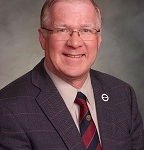Committee questions Hickenlooper’s alternative fuel policy

By Arthur Kane | Watchdog.org
DENVER — State lawmakers said the administration likely will have to take a “budget holiday” from a key initiative of buying new Compressed Natural Gas vehicles after a series of Watchdog.org stories questioned whether the program complies with state law.
Department of Personnel & Administration, Department of Natural Resources and the Colorado Energy Office staff appeared before the Joint Budget Committee on Thursday to answer questions about low CNG use in the dual-fuel vehicles, which often cost $10,000 more than petroleum vehicles.
“I think there will be a budget holiday for CNG vehicles of a certain type while we’re still developing the capabilities,” said JBC chairman state Sen. Kent Lambert, R-Colorado Springs. “It’s not just the number of vehicles but the timing. We’re not going to stop buying CNG vehicles but (determine) what’s the right fit.”
BUDGET MINDER – Sen. Kent Lambert, R-Colorado Springs, said the state will likely take a break from some new CNG purchases.
Lambert directed staff to examine whether Colorado’s CNG program, a major policy push by Gov. John Hickenlooper, abides by state law after Watchdog.org stories questioned CNG program costs to taxpayers.
In September, Watchdog.org stories showed that state CNG vehicles used petroleum much more often than CNG, far-flung departments like DNR couldn’t find filling stations nearby, the vehicles didn’t fit the needs of some employees and the state was spending millions to fund new CNG pumps when a previous taxpayer-funded station closed.
DPA interim Executive Director Kara Veitch said DPA projections show CNG use of about 15 percent would allow the vehicles to comply with state law, which requires the purchase of alternative fuel vehicles but only if they cost 10 percent or less over the vehicle lifetime compared to similar petroleum cars and trucks.
But JBC staff determined that the state’s projections do not meet statutory requirements.
“At 20.0 percent CNG usage, all three vehicles do not meet the statutory base plus ten percent life-cycle cost standard,” the JBC document said.
Staff recommended the Legislature not fund new CNG vehicle purchases in 2015-16 for the governor’s office and the Colorado Department of Transportation and only for DNR vehicles that can be verified to use at least 50 percent CNG. The state also should have a policy to purchase vehicles only when there is 50 percent CNG usage verified for several years, the budget document said.
Lawmakers asked Veitch if DPA has a coordinator who determines whether the vehicle is appropriate for a department’s use and location.
Veitch answered that “there is coordination of what is best suited for the department and their needs.”
But memos obtained by Watchdog.org show that a DPA fleet manager pushed vehicles on DNR and all administration staff.
“The point is not to find ways to ‘get away’ from buying a CNG bi-fuel vehicle, but to find ways to buy more and make them work,” State Fleet Manager Ron Clatterbuck, a DPA employee, wrote last year to a parks and wildlife fleet manager who said the CNG vehicle didn’t fit their expected uses.
“We had a meeting with the Governor’s Chief of Staff on Friday, and she said ‘unequivocally’ that (State Fleet Management) and the agencies need to do better going forward purchasing more CNG vehicles,” he wrote in another memo last year. “So the pressure is increasing and will only intensify as we go forward.”
The JBC took no official action Thursday, but the JBC is expected to vote next month on staff recommendations to limit purchases of new CNG vehicles for next year.







